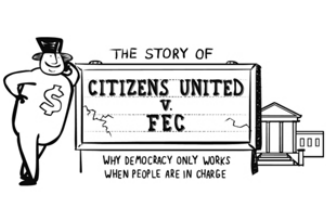 Citizens United v. FEC's impact on US democracy Citizens United v. FEC's impact on US democracy Tags: capitalism, corporations, crime/law/deviance, government/the state, politics/election/voting, campaign financing, citizens united v. federal election commission, democracy, power elite, supreme court, 06 to 10 mins Year: 2014 Length: 8:50 Access: YouTube Summary: This short video created by The Story of Stuff Project explores the relationship between wealth and political power, and examines whether we can speak of democratic elections in the United States. As the video points out, Americans have lost power in their democracy because of modern corporations' single-minded focus on maximizing profits, which have rapidly grown. Although the government can, and should, intervene by setting ground rules to protect society and keep things safe and fair, the reality of the current situation is that corporations, rather than people, write the rules. With Citizens United v. Federal Election Commission (FEC) in 2010, the Supreme Court decided that it is unconstitutional to put any limit on corporations’ financial contribution to elections because it violates free speech (this also invalidated part of the McCain-Feingold Campaign Finance Reform Law). As a result of this decision, corporations can now spend unlimited sums to help elect or defeat political candidates, which makes campaign financing undemocratic. The total cost of elections (congregational and presidential) almost doubled after Citizens United v. FEC, growing from $3.6 billion in 2010 to $6.2 billion in 2012. As the video highlights, the First Amendment was written to protect real people, not corporations. How can people be in charge of democracy again? First, there is a need for a constitutional change, which would overturn the Supreme Court's decision by establishing that corporations do not have the same First Amendment rights as people. Second, in order to eliminate the power of corporations in manipulating the elections, public financing of campaigns needs to be regulated, not liberated. Finally, given that 85% of Americans feel that corporations have too much power and individuals have too little, people should speak up and take social action by fighting for the things people (and not corporations) care about, such as renewable energy, green jobs, health care, safe products, and good-quality education. Submitted By: Nihal Çelik
2 Comments
Manuel Franco
7/29/2023 01:52:07 am
I just want to say Thank You to everyone who supported me through the years. My name is Manuel Franco, New Berlin, Wisconsin. My story of how I won the Powerball lottery of $768.4M is a bit of a tale. I have been playing Powerball tickets for 6 years now since I turned 18. I bought my first ticket on my 18 birthday. I was feeling very lucky that day because I had contacted Dr. Odunga Michael to help me with the winning Powerball numbers. I really had that great great feeling that I looked at the camera wanting to wink at it. I only did a tiny part of it and trusted him. He gave me the numbers after I played a couple other tickets along with it for $10. I checked my ticket after the winnings came online and saw the numbers were correct including the Power play. I screamed for about 10 minutes because it felt like a dream. I had won $768.4M. You can check my winning testimony with the lottery officials just with my name search. Thank you Dr Odunga. Well, his email is [email protected] and you can also call or Whats-app him at +2348167159012 so you guys can contact him
Reply
mark hold
7/7/2024 02:28:42 pm
One faithful day as i was watching a video on you tube i saw a comment of one MR PAUL HAVERSACK testifying of this great herbal healer doctor Moses Buba,That helped him enlarge his manhood .i was shocked and happy, so i quickly visited his website and emailed him within 30 mins he got back to me and told me all i need to buy and i did so after 4 days i received his herbal medicine ,he gave me instructions on how to use it ,as i am speaking to you people now after using the cream for just two weeks my manhood size is 10 inches long and 8.0 girth ,,am so happy and grateful for his work in my life thank you so much Doctor Moses buba ,,i also learnt he has cure for LOW SPERM COUNT,PREMATURE EJACULATION,ERECTILE DYSFUNCTION,HIV/AIDS VIRUS,DIABETES 1/2,HERPES DISEASE,CANCER,and lots more
Reply
Leave a Reply. |
Tags
All
.
Got any videos?
Are you finding useful videos for your classes? Do you have good videos you use in your own classes? Please consider submitting your videos here and helping us build our database!
|
 RSS Feed
RSS Feed
